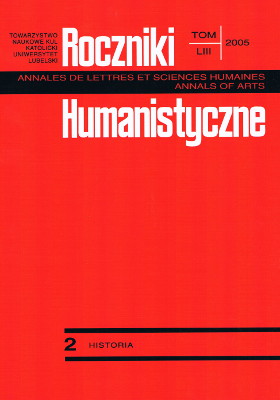The Income of the Holy Spirit Hospital in Lublin in the 16th-17th Centuries
Abstract
The work of the Holy Spirit Hospital and Church in Lublin was secured by using the property they owned and by the income obtained from its commercial part. They were „steady” and depended on the managers of the hospital. The hospital account books from the years 1548-1556 and 1604-1628 show that there was a change in this respect caused by funding a Carmelite monastery on the hospital grounds in 1610, as in the middle of the 16th century the income came mostly from the hospital's suburban estates, whereas at the beginning of the 17th century it mainly came from buildings within the town (from 43 to 25% the proportions changed to 12 to 69%). Besides the steady income the hospital obtained means from numerous donations and charities received mainly by testament, that were an expression of individual piety. The great amount of these small legacies – that not always had the form of money, – rarely recorded in the source materials, or not recorded at all, made it possible to finance the current charity work without any breaks. Acquiring income from legal acts (among others, testaments, agreements, judgments), that resulted from support given to the hospital by town authorities is easier to follow. In the middle of the 16th century the unsteady income amounted to 6-30% of all the money obtained by the hospital, and at the beginning of the 17th century already to 28-53%. This proportion influenced both reconstruction of the hospital buildings and the range of the charity work undertaken by the hospital.
References
Słoń M., Szpitale średniowiecznego Wrocławia, Warszawa 2000.
Lesiński B., Kupno renty w średniowiecznej Polsce na tle ówczesnej doktryny i praktyki zachodnioeuropejskiej, Poznań 1966.
Góralski Z., Szpitale na Lubelszczyźnie w okresie przedrozbiorowym, Warszawa 1982.
Wyrobisz A., Misericordia pestis tempore. Postawy i zachowania w czasie zarazy w Polsce nowożytnej (XVI-XVIII w.), w: Charitas. Miłosierdzie i opieka społeczna w ideologiach, normach postępowania i praktyce społeczności wyznaniowych w Rzeczypospolitej XVI–XVIII wieku, red. U. Augustyniak, A. Karpiński, Warszawa 1999.
Zaremska H., Niegodne rzemiosło. Kat w społeczeństwie Polski XIV-XVI w., Warszawa 1986.
Kamler M., Świat przestępczy w Polsce XVI i XVII stulecia, Warszawa 1991.
Maisel W., Poznańskie prawo karne do końca XVI wieku, Poznań 1963.
Copyright (c) 2005 Roczniki Humanistyczne

This work is licensed under a Creative Commons Attribution-NonCommercial-NoDerivatives 4.0 International License.





